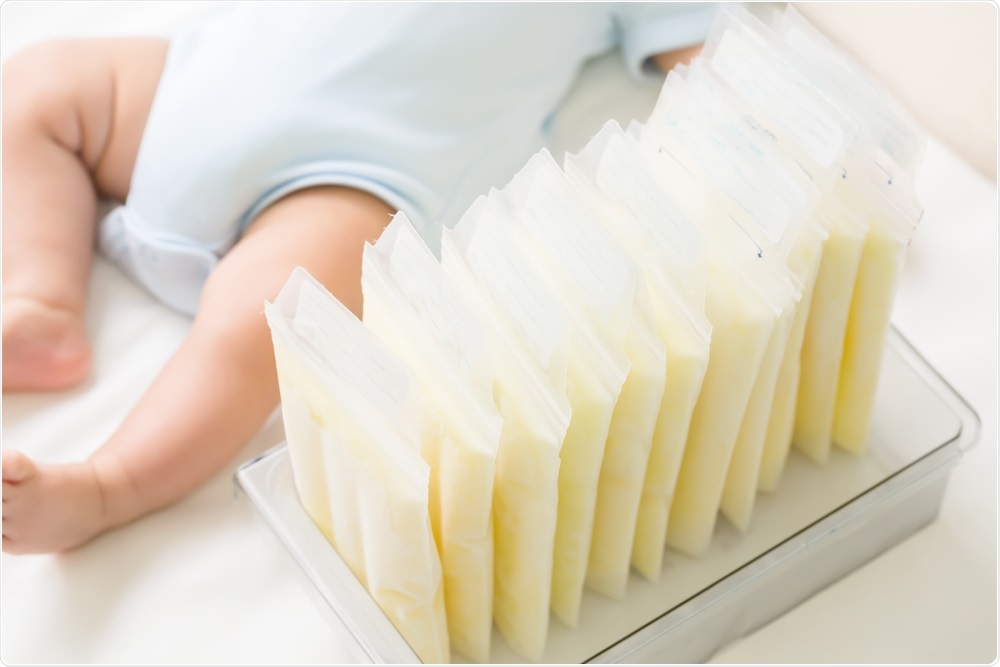Researchers in Germany have shown that human milk infected with severe acute respiratory syndrome coronavirus 2 (SARS-CoV-2) can be pasteurized using a standard method to ensure it is safe for breastfeeding.
Holder pasteurization, which involves heating the milk at 62.5°C for 30 minutes, is an internationally recommended and widely used technique in human milk banks.
SARS-CoV-2 has recently been detected in the milk of infected mothers, prompting concerns about the safety of continuing to breastfeed post-infection.
Now, researchers from Ruhr University Bochum, Ulm University Medical Center, and various other institutions in Germany have shown that Holder pasteurization provides a safe option for infected mothers who want their infants to continue benefiting from breastfeeding.
A pre-print version of the paper is available in the server bioRxiv*, while the article undergoes peer review.

Image Credit: comzeal images / Shutterstock

 This news article was a review of a preliminary scientific report that had not undergone peer-review at the time of publication. Since its initial publication, the scientific report has now been peer reviewed and accepted for publication in a Scientific Journal. Links to the preliminary and peer-reviewed reports are available in the Sources section at the bottom of this article. View Sources
This news article was a review of a preliminary scientific report that had not undergone peer-review at the time of publication. Since its initial publication, the scientific report has now been peer reviewed and accepted for publication in a Scientific Journal. Links to the preliminary and peer-reviewed reports are available in the Sources section at the bottom of this article. View Sources
Concerns about mothers infected with SARS-CoV-2
The coronavirus disease 2019 (COVID-19) pandemic has sparked serious concerns about the risks associated with SARS-CoV-2 infection among pregnant or breastfeeding women.
Initially, researchers reported no detection of SARS-CoV-2 in the breast milk of infected mothers, and the risk for vertical (mother-to-baby) transmission was considered very low.
However, Stephanie Pfaender and colleagues, as well as other research groups, have recently reported detecting SARS-CoV-2 RNA in breast milk samples taken from mothers with COVID-19.
In two cases where mothers continued to breastfeed, the infants also tested positive for the virus, and in one case, a baby developed severe respiratory disease.
Although the source of infection among the newborns is unclear, the findings raise concerns about potential transmission to infants via breast milk, say Pfaender and team.
These concerns are particularly important to address since breastmilk contains various nutrients, hormones, and immune system components that significantly benefit developing newborns. Breastfeeding is widely recommended as the optimal method for feeding babies.
Mothers with SARS-CoV-2 are currently advised to continue breastfeeding
Currently, the World Health Organization advises infected mothers to continue breastfeeding, while following strict hygiene measures such as wearing masks to shield infants from exposure to infected droplets or aerosols.
The Centers for Disease Control and Prevention says the decision over whether to continue breastfeeding lies with the mother and her family and healthcare provider, although mothers are generally advised to continue.
However, since the virus has recently been detected in maternal breast milk, the possibility of vertical transmission cannot be overlooked, and safety measures to protect infants are urgently needed, say Pfaender and team.
Testing whether Holder pasteurization can make the milk safe
Now, the team has tested whether SARS-CoV-2 present in breast milk can be inactivated using Holder pasteurization to minimize the risk of transmission, while still maintaining the milk’s many beneficial, protective properties.
“Here, we evaluated holder pasteurization as an easy and inexpensive method to inactivate infectious SARS-CoV-2 in breast milk,” writes the team.
Five different isolates of SARS-CoV-2 were introduced to five different breast milk samples, which were then incubated for 30 minutes, either at room temperature or at 63°C.
On testing the samples for residual infectivity, the researchers found that all five SARS-CoV-2 isolates were still infective in all samples that had been incubated at room temperature.
However, none of the samples subjected to Holder pasteurization showed any residual infectivity.
“Viral infectivity is completely eliminated by this treatment”
“Our data show that independent of the tested SARS-CoV-2 isolates or the breast milk sample, viral infectivity is eliminated completely by this treatment,” say Pfaender and team. “Thus, human breast milk containing infectious SARS-CoV-2 can be efficiently inactivated using standard holder pasteurization.”
The researchers say their study shows that infected mothers who still want to breastfeed rather than use formula milk can be reassured that Holder pasteurization is a safe way to proceed.
“We here provide a safe and feasible option, when in doubt, to continue feeding of the infant with breast milk upon symptomatic SARS-CoV-2 infection of the mother,” the team concludes.

 This news article was a review of a preliminary scientific report that had not undergone peer-review at the time of publication. Since its initial publication, the scientific report has now been peer reviewed and accepted for publication in a Scientific Journal. Links to the preliminary and peer-reviewed reports are available in the Sources section at the bottom of this article. View Sources
This news article was a review of a preliminary scientific report that had not undergone peer-review at the time of publication. Since its initial publication, the scientific report has now been peer reviewed and accepted for publication in a Scientific Journal. Links to the preliminary and peer-reviewed reports are available in the Sources section at the bottom of this article. View Sources